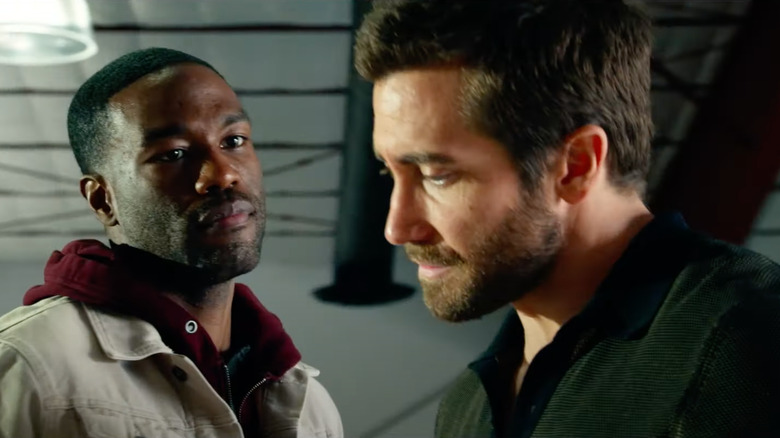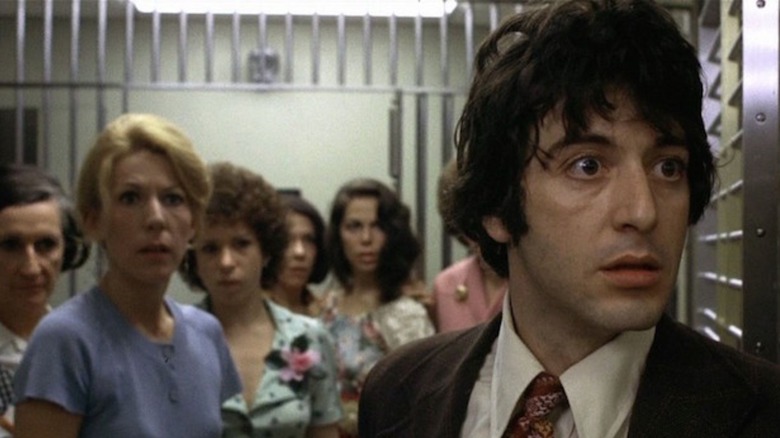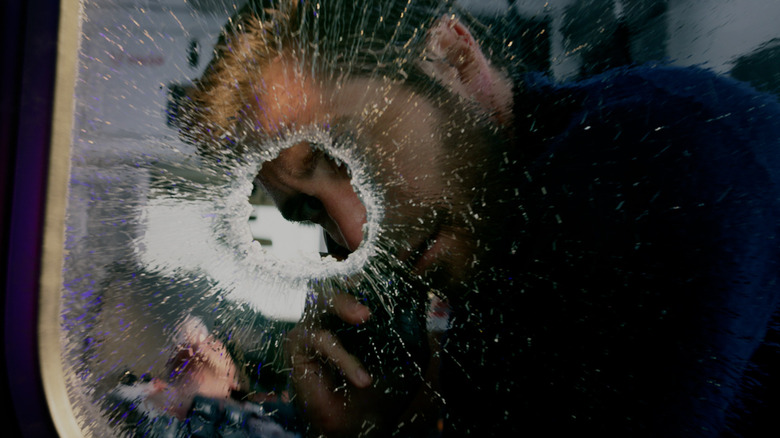Ambulance Ending Explained: No Heroes, No Villains
Human society can be seen as one big extension of the internal systems keeping every one of us alive: an intricate, interwoven series of organisms with specialized functions that need to work in concert with each other to serve the whole. The big difference is that white blood cells and proteins and the like don't have individual sentience, whereas every living person keeping a place running — like, say, a major city — is faced with the problem of choice each day.
"Ambulance," the new film from director Michael Bay and writer Chris Fedak, has its title stylized in both its advertising materials and the film's end credits to highlight the "LA" in the middle of the word, emphasizing the importance and prominence of the movie's location: the city of Los Angeles. While an inordinate number of movies like to claim that their locations are "like another character" in their films, "Ambulance's" emphasis on its urban setting is well earned.
As Fedak explains via a press kit from Universal, "I fell in love with writing 'Ambulance' because the story allowed me to make it about real people," and that despite the movie's non-stop, large-scale action, "it was still an intimate story, primarily about three characters." Those three principal characters represent a cross-section of LA's citizenry, people whose choices organically affect the lives of everyone around them. With Fedak and Bay's interest in approaching the film from a macro perspective (figuratively and also literally, with regard to the cinematography), "Ambulance" becomes a remarkably nuanced and empathetic movie where the heroes and villains are not so clear-cut.
Lending a helping (and healing) hand
"Ambulance" is based on a 2005 Danish film, "Ambulancen," and that movie also features a combination of action and suspense with a series of moral character dilemmas. However, where that film was more intimate, Bay and Fedak's "Ambulance" expands to include nearly the entire city of LA, with the three principals at the heart of the conflict.
Those three characters are Will Sharp (Yahya Abdul-Mateen II), his brother by adoption Danny (Jake Gyllenhaal), and LA County paramedic Cam Thompson (Eiza González), all of whom are stuck for most of the film in the titular ambulance when the brothers commandeer it after a bank robbery gone wrong. The mostly unconscious but still barely alive fourth passenger is a rookie cop fresh from the academy, Zach (Jackson White), who is bleeding out from gunshots fired by Will in a scuffle during the robbery.
Following a long and harrowing chase around LA, the ambulance finally finds itself driven right up to the emergency room entrance of a hospital by Danny in a frantic attempt to save Will's life after he'd been accidentally shot by Cam. When Cam confesses her mistake, Danny becomes enraged, attempting to force the mobilized LAPD and FBI units outside to stand down long enough for him to emerge from the vehicle and murder Cam in front of everyone, knowing it'll mean his own death soon after. As he steps out of the vehicle, Danny is shot from behind by a still conscious Will, the two brothers sharing a final look as Danny dies and Will is arrested.
After Agent Clark (Keir O'Donnell) attempts to dissuade a now freed Cam from helping her former captor, Cam pushes through a crowd to help Will into the hospital, and then surreptitiously sneaks a few million dollars from the robbery into the possession of Will's wife, Amy (Moses Ingram). As Will heals from his wounds in the hospital under police custody, Officer Zach makes a statement that Will saved his life while Cam visits the bed of a little girl, Lindsey (Briella Guiza), whose life she saved before she was taken hostage.
1970s characterizations meets 'Bayhem'
The official press notes for the film reference a number of 1970s thrillers as primary influences on "Ambulance," including such classics as "The Taking of Pelham One Two Three" and "Dog Day Afternoon." Impressively, "Ambulance" captures the way those films portrayed their characters with grit, nuance, and complexity, refusing to demonize or lionize anyone. While Fedak's script is often on the nose when it comes to relaying information about these people and their motivations, the ethical dilemmas each of them face are never given obvious or easy answers. In "Ambulance," just as in those '70s films, characters committing criminal acts have deeply empathetic reasons for their actions, just as characters on the side of law and order don't always have the best interests of others at heart.
If the movie is frequently shouting things that would go down easier more naturalistically, it's because "Ambulance" presents the peanut-butter-and-chocolate-esque delight of having complex characters be suddenly caught up in, well, a Michael Bay film. Shot for just $40 million as a way for the director to make a small movie during the pandemic—let me restate that for emphasis: Bay's version of "small" is a film where entire swathes of vehicles are crashed and exploded — "Ambulance" endorses Danny and Will's credo of "we don't stop," moving like a bat out of hell as soon as things begin to go south. This gives Bay license to unleash his signature "Bayhem," a cinema of excess so recognizable by this point it's become the subject of this Every Frame a Painting analysis, not to mention a part of /Film's review of the movie.
Director of photography Roberto De Angelis, in conjunction with Bay, utilizes a mixture of mobile camera cranes, helicopters, and drones to fling the camera around in a fashion that would make Sam Raimi blush, reflecting the life-and-death stakes of the characters visually at all times. Bay ensures that although the story is intimate, the palette is constantly looking at the big picture, the film's ensemble and the city of LA never far from frame. While explosions occur by the minute and Danny, Will and Cam's plight is the focus, everything is connected, and everyone has their own perspective.
An advertisement for understanding
The key to unlocking — if not necessarily appreciating — Bay as a filmmaker is knowing that he got his start directing commercials, and that he is a consummate commercial director. Bay is a master at delivering a flurry of information in a compressed amount of time (witness the genius of his famous "Got Milk?" commercial), which is why his feature-length movies tend to feel exhausting and overstuffed. His knack for the sell extends not just to copious amounts of unabashed product placement in his films but to his entire aesthetic, making sure that every actor on screen is as beautiful as possible and every emotional beat is wrung dry.
While Bay has never switched up this style and likely never will, one of the things that makes "Ambulance" so unique and exciting is the way he applies it to a story that invites empathy, nuance, and debate. Every character's storyline is resolved, yet the ambiguity surrounding their choices and how the audience is meant to view them remains. Since he can't easily label such characters "good" and "bad," Bay instead sells them on their own terms: Danny pays for his transgressions yet dies truly loving his brother, Will crosses any line in order to selflessly save another, and Cam realizes that the job of saving lives can extend beyond rigid parameters.
In this way, "Ambulance" becomes an advertisement for understanding, an honestly and sadly radical notion in a post-Trump, current-pandemic, and near-world-war climate. While the film's final shot closely resembles a recruitment video for EMTs, it's not a job that Bay is selling so much as Cam herself, the movie recognizing her heroism in dedicating her life to helping others despite her blemished past. Of course, the real final shot is of Los Angeles, the city the film depicts, the place where all these people and more have to try and live together and help each other. Bay's prior films have traditionally depicted the military as one monolithic force for good, but here the forces of authority are called into question. It's not institutions or systems we should put our faith in, "Ambulance" says, but individuals. If the human organism is going to be saved, then we all have to do our part.



